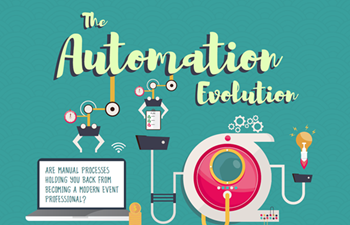The work of an organizer isn’t over when the event ends. In reality, these professionals need to constantly seek out lessons from the good, the bad and the ugly. By doing so, they can understand how to improve events in the future and the best way to achieve this is to take the feedback of attendees into account.
Gathering reviews can be a time-consuming process, which is why it pays to create a post-event survey. It’s a tried and tested method, with 90% of organizers using them to understand attendee satisfaction and a metric designated as a KPI by 80% of event planners when measuring event success.
What is a post-event survey?
This is an opportunity for guests to provide feedback in a quick and simple way. However, beyond generic questions asking people how they heard about your event or how likely they are to recommend it to a friend, it can be difficult to draw out information that you can act on.
To design your post-event survey, you’ll need to pose a variety of questions that prompt readers to think a bit more deeply about their experiences. From rating aspects of the event to open-ended descriptions, with the right preparation, you’ll find out exactly what is - and isn’t - working well for you.
The questions your post-event survey should include
A good post-event survey will always feature questions that vary in nature. These include, but are not limited to:
- ‘Yes or no’ questions
- Net promoter score (NPS) questions
- Open-ended questions
- Nominal questions
Questions that require a yes or no answer are simple and generally precede an open-ended question in which respondents can provide qualitative feedback. Nominal questions are ideal if you’re trying to identify or segment your audience. For example, you might ask about respondents’ job titles, income and so on.
NPS, on the other hand, is a calculation based on the percentage of positive (promoter) and negative (detractor) responses. The formula is simple: NPS = promoters (%) - detractors (%). Generally, on a scale of one to ten, attendees that respond with a six or lower are considered to be detractors, while those answering with a nine or ten are promoters.
‘Yes or no’ questions
1. Did the event meet your expectations?
To measure the success of your event, you must understand how your attendees felt and whether it was worth their time and money, or not. This type of question is often useful when directly preceding an open-ended question, giving your audience the chance to elaborate.
2. Would you attend our events in the future?
This question is perfect for figuring out how your marketing strategy has performed and if your organization has developed authority within its industry. You’ll be able to see how many people want to be informed and up to date with your events.
3. Did you have an opportunity to participate and ask questions?
If the response to this question isn’t overwhelmingly positive, it’s a clear indication that you need to promote your support channels better. Attendees should feel supported and know where to turn for help at your event, so when questions arise, make sure your guests are in good hands.
4. Would you recommend this event to your colleagues?
People are far more likely to purchase a product that’s recommended by somebody they trust. So, the power of reviews is not something to be underestimated. Simply having positive opinions of your products or services isn’t enough - real success is found when people are talking about you with their colleagues, friends and families.
Open-ended questions
1. What was your favorite moment or experience at the event?
This is a great question to help you gain an idea of how to plan future events. Responses should give a clear idea of what attendees thought was great and, by the power of elimination, what they didn’t think was particularly spectacular.
2. What could we improve next time?
Another chance to guide future plans in the right direction, it’s always useful to include questions that incite constructive criticism. Understanding the specific aspects of your event that weren’t received well by participants is integral to ensuring your next event is more successful.
3. Why did you choose to attend this event?
This is a great way to start the marketing for your next event, so don’t skip this question. Your audience can let you know exactly what they liked about your marketing strategy and what it led them to expect from the event.
4. What was your biggest takeaway from the event?
It’s important to compare the overall goals of your event to what attendees actually took from it. You’ll learn what guests understood, which will be invaluable in future planning and marketing.
NPS questions
1. How satisfied were you with this event?
This is the question you’d have probably thought of first. You could stretch it further by asking participants to rate specific aspects, from catering to the venue and date. This will allow you to measure success in each area and should be near the top, if not the first question, of your post-event survey.
2. How useful was this event?
Although contingent on the type of event you are hosting, it’s important to understand if guests felt like they benefited from attending. You can use this question to quantify how actionable the content of your event was.
3. How helpful were the event staff?
If you want to figure out how your staff performed during the event - which you should - this is the question to ask guests. It’s useful to know how employees dealt with attendees using support or asking questions and it’ll help you to understand how quickly problems were addressed.
4. How satisfied were you with the networking opportunities provided?
Plenty of events are designed with networking in mind and lots of professionals attend for that exact reason. If this sounds like your business or audience, then it’s imperative to measure how successful the networking opportunities were at your event. This could also be an open-ended question to gather information about what your guests specifically liked or disliked.
Access the latest business knowledge in Marketing
Get Access





Comments
Join the conversation...